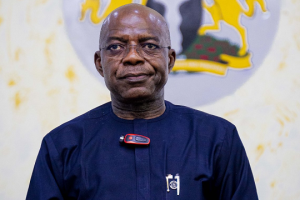
The Court of Appeal in Lagos has nullified the life sentence conviction of Dr. Olufemi Olaleye, the Medical Director of Optimal Cancer Care Foundation, who had been sentenced to life imprisonment in October 2023 by the Lagos State Sexual Offences and Domestic Violence Court for the alleged rape of his wife’s 16-year-old niece.
In a landmark decision on Friday, the appellate court ruled in favor of Dr. Olaleye, acquitting him of all charges. The three-member panel of justices—led by Justice Jimi Olukayode Bada, alongside Justices Mohammad Sirajo and Folasade Ojo—found that the prosecution had failed to present credible evidence to support the charges against the defendant.
Dr. Olaleye’s conviction had stemmed from a case brought by the Lagos State Government, with the charges alleging that he sexually assaulted and defiled his wife’s niece, a minor, between 2022 and 2023. The prosecution presented what it claimed was a compelling case, including a confessional statement made by Olaleye to his former counsel, Mr. Olalekan Buruji, and the Divisional Police Officer (DPO) at the Anthony Police Station, Lagos State. This statement reportedly contained a confession where Olaleye allegedly expressed regret for his actions. Furthermore, the prosecution argued that the victim, identified as a 16-year-old girl, provided testimony corroborating the charges.
However, the Appeal Court judges were critical of the evidence presented in the case, particularly the testimony of Oluremi, the defendant’s wife. In the judgment, the appellate court concluded that Oluremi’s conduct indicated that she was motivated by personal interests, notably a desire to take control of her husband’s assets following his possible incarceration. The court found that Oluremi’s testimony lacked credibility, stating that her motives seemed to have played a significant role in her involvement in the case.
The Court of Appeal also took issue with the prosecution’s reliance on hearsay evidence regarding the age of the alleged survivor. The judges pointed out that none of the witnesses presented by the prosecution had direct knowledge of the survivor’s birth, and as such, they deemed the assertion that the survivor was 16 years old to be unsupported by factual evidence. In its judgment, the appeal court emphasized the importance of presenting solid, direct evidence in criminal cases, especially in matters as serious as sexual assault.
Further compounding the flaws in the prosecution’s case, the appellate court dismissed the testimony of key witnesses who had been involved in the investigation, including a child forensic specialist from the Mirabel Centre and the investigating officer. The court described their testimonies as “worthless,” stating that they did not provide credible support for the allegations against Dr. Olaleye.
Another significant aspect of the appeal was the criticism leveled at the trial judge, Justice Rahman Oshodi, for allegedly overstepping his role in the case. The Court of Appeal noted that Justice Oshodi had “interfered” in the proceedings by trying to fill in the gaps left by the prosecution’s weak case. The judges expressed concern that this judicial intervention may have resulted in an unfair trial for the defendant.
In its ruling, the Court of Appeal also addressed the issue of the prosecution’s failure to present material witnesses who could have corroborated the alleged confession made by Olaleye. According to the judgment, two family members who were said to have witnessed Olaleye’s purported confession were never called to testify, further weakening the case against him.
Ultimately, the Court of Appeal resolved all five issues raised in the appeal in favor of Dr. Olaleye. The justices ruled that the evidence against him was insufficient, and the lower court had erred in its judgment. As a result, the appellate court discharged and acquitted Dr. Olaleye, and his life sentence was overturned.
The ruling has drawn widespread attention, with legal experts and the public questioning the integrity of the initial trial. Many have expressed concern over the handling of the case, especially in light of the serious nature of the charges and the implications for both the defendant and the alleged victim. While the appeal court’s decision has cleared Dr. Olaleye of any wrongdoing, it has also raised important questions about the reliability of evidence presented in sexual offence cases, particularly when it comes to matters of hearsay and witness credibility.
Dr. Olaleye, who had maintained his innocence throughout the trial, has yet to publicly comment on the judgment. The case has sparked debates about the justice system’s handling of sexual assault cases, particularly in instances where the evidence is disputed or unclear.
As of now, the focus is on the implications of this ruling, which not only impacts Dr. Olaleye’s life but also serves as a reminder of the need for careful examination of evidence in the legal process. The case has also drawn attention to the potential for personal motives to influence legal proceedings, particularly in family-related disputes. The discharge and acquittal of Dr. Olaleye may have broader repercussions for similar cases in the future, as legal practitioners and the public continue to reflect on the importance of fair trials, credible evidence, and judicial impartiality.





